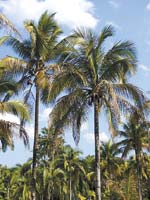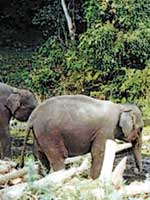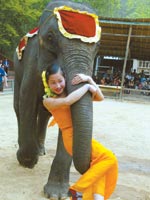|
Tropical paradise
By Li Jing ( Beijing Weekend)
Updated: 2004-06-17 14:15
 Located in Yunnan Province in southwestern part of China, Xishuangbanna is famous for its mysterious tropical rainforests, wild animals and minority customs. Located in Yunnan Province in southwestern part of China, Xishuangbanna is famous for its mysterious tropical rainforests, wild animals and minority customs.
Xishuangbanna is an area of China that few travellers afford themselves the time to see. Yet it is a mysterious paradise.
As the only tropical rainforest nature reserve in China, Xishuangbanna is ideal for nurturing wonderful plants and flora and is home to unusual wildlife.
Old trees reach into the skies here, vines twist and grow together.
Western adventurers have journeyed here seeking rich biological treasures as far back as the Qing Dynasty (1644-1911). For many years, Xishuangbanna's fame as a natural paradise was as well known as that of the Amazon.
Dai Minority people have lived on this land for generations. The distinctive natural environment here has created unusual customs and traditions.
All over the region, even today, Dai houses can be seen. These bamboo structures raised on stilts deter floods and dangerous animals, allowing many people to inhabit one house safely, often along with all their animals too.
Hunting is still the main source of income, in conjunction with farming. In terms of culture, the Dai people dress in spectacular colours and furs, and dance and song are popular ways to pass the time.
Now visitors can enjoy folk dance and other performances in local scenic spots in Xishuangbanna, thanks to the quickly developed tourism.
Buddhism is the predominant religion here. Temples and pagodas with a Southeast Asian flavour are dotted about the countryside and towns, and monks, especially young male trainee boys, are a common sight, clothed in traditional orange costume, often riding motorbikes to the temple.
Here are the main attractions for a trip to Xishuangbanna:
Wild Elephant Valley
 To the Dai people, the elephant is the symbol of good luck, might and longevity. To the Dai people, the elephant is the symbol of good luck, might and longevity.
The wild elephants of Xishuangbanna mainly live in the Wild Elephants Valley (yexiang gu), at the juncture of the western and eastern part of Menyang natural reserve.
In the valley, there is an observation tower, especially built for tourists. The best time to see these impressive beasts is at dawn or dusk. There are currently 300 elephants living in the dense forest in Xishuangbanna, known locally as the "kingdom of elephants."
Admission: 20 yuan (US$2.5)
Tropical Botanic Plant Garden
The garden is one of the major attractions in Xishuangbanna. Situated on Hulu Island, the garden contains 3,000 different types of plant. The environment here is spectacular, surrounded by rivers and mountains and containing a wealth of rare and unusual plants, trees and flowers.
Admission: 25 yuan (US$3)
National Minorities Custom Park
 he park (minzu fengqingyuan) is located near pretty Liusha River, one kilometre away from Jinghong. he park (minzu fengqingyuan) is located near pretty Liusha River, one kilometre away from Jinghong.
Occupying an area of 30 hectares, the park is covered with all kinds of tropical and fruit trees. Six minority group customs are detailed here including Dai, Akha, Jinuo, Bulang, La and Ya.
Different ethnic performances and activities are usually held each Wednesday and Saturday evening.
Orchards can be found in the park. At harvest time, visitors can pick up some tropical fruits here.
How to get there:
There is no direct flight from Beijing to Xishuangbanna. But there are many flights to Kunming, the capital of China's Yunnan Province. Flights are available daily between Beijing and Kunming. A flight usually takes three hours and costs 2,000 yuan (US$125) one way.
Xishuangbanna has opened many flights to Kunming (one hour), Chengdu (two hours), Shanghai (four hours), Dali (one hour) and Bangkok (two hours).
After getting to Jinghong, the capital city of Xishuangbanna region, there are different transportation means to the above-mentioned destinations.
To Elephant park: The park is 45 kilometres north of Jinghong by the highway linking Jinghong and Simao. You can take the bus to Simao from the main bus station in Jinghong and get off at the park. It takes 30 minutes and costs 10 yuan (US$1.2).
To the botanic garden: From the main bus station in Jinghong, take a bus heading towards Mengla or Menglun. These buses leave every hour from 7:30 am to 3 pm. The fee is 12 yuan (US$1.4).
To minorities park: The park is conveniently located one kilometre south of Jinghong. A taxi should cost about 10 yuan (US$1.2).
|
